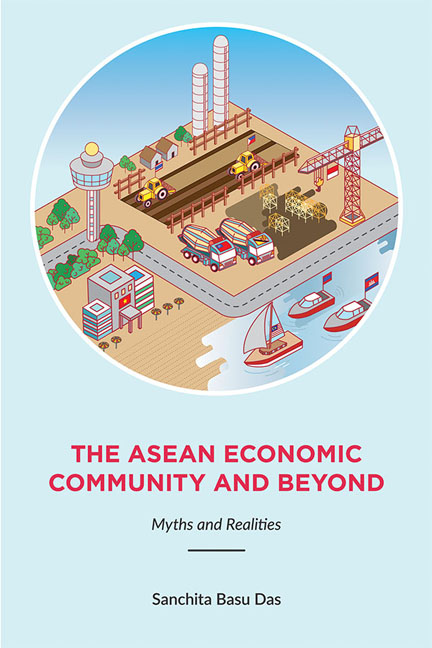Book contents
- Frontmatter
- Dedication
- Contents
- Foreword
- Acknowledgements
- Abbreviations
- 1 Introduction: The ASEAN Economic Community and Beyond
- I THE ASEAN ECONOMIC COMMUNITY (AEC)
- 2 The ASEAN Economic Community: An Economic and Strategic Project
- 3 Can the ASEAN Economic Community Be Achieved by 2015?
- 4 Goods to Flow Slow and Steady within the ASEAN Economic Community
- 5 The Limited Impact of the ASEAN Economic Community on Skilled Labour Migration
- 6 Five Facts About the ASEAN Economic Community
- 7 Growing Economic Diplomacy in ASEAN: Opportunities and Threats
- 8 Towards ASEAN Economic Community 2025!
- II BEYOND THE ASEAN ECONOMIC COMMUNITY
- III AN ASEAN PERSPECTIVE OF REGIONAL CONNECTIVITY
- Appendix: Summary of the Trans-pacific Partnership Agreement
- Index
- About the Author
5 - The Limited Impact of the ASEAN Economic Community on Skilled Labour Migration
from I - THE ASEAN ECONOMIC COMMUNITY (AEC)
Published online by Cambridge University Press: 19 May 2017
- Frontmatter
- Dedication
- Contents
- Foreword
- Acknowledgements
- Abbreviations
- 1 Introduction: The ASEAN Economic Community and Beyond
- I THE ASEAN ECONOMIC COMMUNITY (AEC)
- 2 The ASEAN Economic Community: An Economic and Strategic Project
- 3 Can the ASEAN Economic Community Be Achieved by 2015?
- 4 Goods to Flow Slow and Steady within the ASEAN Economic Community
- 5 The Limited Impact of the ASEAN Economic Community on Skilled Labour Migration
- 6 Five Facts About the ASEAN Economic Community
- 7 Growing Economic Diplomacy in ASEAN: Opportunities and Threats
- 8 Towards ASEAN Economic Community 2025!
- II BEYOND THE ASEAN ECONOMIC COMMUNITY
- III AN ASEAN PERSPECTIVE OF REGIONAL CONNECTIVITY
- Appendix: Summary of the Trans-pacific Partnership Agreement
- Index
- About the Author
Summary
With the deadline of 31 December 2015 looming ever closer, there are increasing discussions on the form and bearing of the ASEAN Economic Community (AEC) on labour markets. AEC's impact on the region's employment prospects comes from two channels — first from the structural changes in domestic economies; and second from the AEC's promotion of free movement of skilled labour through the establishment of Mutual Recognition Arrangements (MRAs) of professional services.
With structural change overtime, the AEC can potentially boost the region's GDP by 7.1 per cent by 2025 and generate 14 million jobs in the process. However, the gains will not be evenly distributed across countries, sectors or skill groups. As for the MRAs, although they have been signed for eight professions, their effectiveness in promoting greater flows of professional services within the region is negligible, as the individual economies are yet to align their domestic rules and regulations to the regional initiative.
Although the changes in the labour market will take time to materialize, policymakers need to start preparing for them now. They should come up with coordinated and coherent policies for both regional and national levels in order to ensure inclusive and fair outcomes. For MRAs to work effectively, much will depend on unilateral actions of member economies and their willingness to change domestic laws to facilitate the movement of professionals. Even if these happen, policymakers will subsequently need to clearly communicate their policy directions and convince their professional bodies to share the same objective and vision.
INTRODUCTION
With the deadline of 31 December 2015 looming ever closer, there are increasing discussions on the form and bearing of the ASEAN Economic Community (AEC). Citizens in general are concerned not only about more choices of consumer products but also about employment prospects. This is because the AEC envisions ASEAN as a single market and production base characterized by free flow of goods, services, and investments, as well as freer flow of capital and skilled labour.
AEC's impact on the region's employment prospect comes from two channels. First, from the structural change in the domestic economies — trade integration is expected to bring changes in resource allocation across sectors as a result of shifts from less productive to more productive economic activities.
- Type
- Chapter
- Information
- The ASEAN Economic Community and BeyondMyths and Realities, pp. 51 - 58Publisher: ISEAS–Yusof Ishak InstitutePrint publication year: 2015



